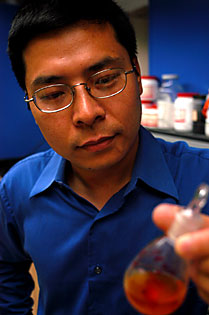 |
|
DAVID HARDEN/Arizona Daily Wildcat
|
Chemistry professor Zhiping Zheng, who is being offered tenure at UA, holds up a liquid that will be made into a material for making color for TVs in his lab yesterday at the Old Chemistry building.
|
|
By Tacie Holyoak
Arizona Daily Wildcat
Friday May 2, 2003
92 UA professors have applied for promotions, while others work to upgrade to a permanent status
Many professors will keep a close eye on their mailboxes this month, as they wait for letters that could determine whether they become permanent UA fixtures or seek employment elsewhere.
This year, 92 professors submitted requests for promotion, and many are vying for the upgrade to tenure.
After six years of teaching at UA, professors must obtain tenure or they will receive an extended contract that guarantees only one additional year of employment, said Anna Elias-Cesnik, senior associate to the vice provost.
But getting there is not an easy task.
"I started when I started working here," said Zhiping Zheng, an assistant professor in chemistry who will begin his sixth year next semester.
Zheng has already begun to compile a record of his accomplishments and a list of references in a package called a dossier.
"I have been collecting all the materials," he said, adding that he plans to submit his dossier to the chemistry department for review by late July or early August.
"That's just the beginning of the process," said Sidney Levy, interim marketing department head.
For nine months, several committees examine and vote on a professor's eligibility for tenure. Reviews begin on the department level and are passed up through the dean's office, a university-wide committee, and finally, the Office of the Provost.
Professors are reviewed mainly for three things, said Gail Burd, acting head of the molecular and cellular biology department.
First, they must prove they've done enough research, and they must publish their work. In Burd's department, a professor is expected to publish research in top journals once a year, although twice is preferred, she said.
"They must have very strong teaching credentials," she said. That's where all those evaluations come in. Evaluations from students and peers are weighed heavily.
A professor must also have a record of service to the community and the university.
"It's a highly competitive activity," Levy said.
Some do not understand the idea of tenure though, Levy said. It is often misunderstood and regarded casually as a way to guarantee a position, when, in fact, it holds much more significance.
Tenure is used to maintain the highest quality possible, he said. "Universities compete for these outstanding faculty."
Those who have recently completed the tenure track need little reminding of its significance.
"(Tenure) is not easy to get," said John Hartman, an associate computer science professor who earned tenure in Spring 2001.
"It's a stressful six years," he said. "You're constantly working. For six years, you worry about whether you're doing the right things."
"It's very serious," said Mark Smith, head of the chemistry department.
For professors who spend six years of their life working toward a tenured position, a negative decision can be devastating, he said.
Last year, five candidates were denied tenure, Elias-Cesnik said, and although the number of those denied is usually pretty low, they possibility still worries many applicants.
Everything a professor does is to get to that point, Hartman said. And when they finally get there, they "sit on pins and needles" waiting for the results.
The dossiers pass through several steps, he said. "It can go awry at any of those levels."
Zheng, however, is more hopeful than worried.
"I wouldn't say it's easy," he said. "(But) if you work hard and make an effort, the degree of success is reasonable."
"If your work is deserving · you should get it," he said.

